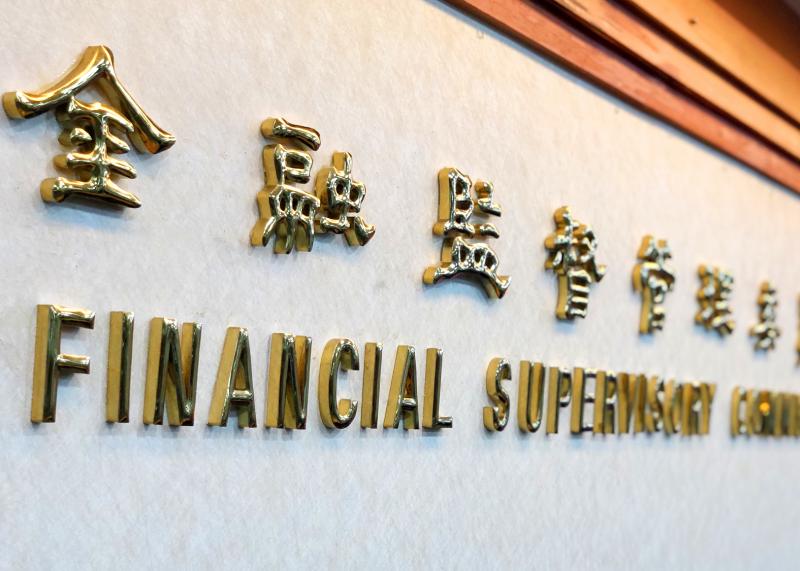The Financial Supervisory Commission (FSC) plans to strictly supervise foreign-registered Taiwanese companies listed on the Taiwan Stock Exchange after Tony Huang (黃文烈), the former chairman of Cayman Islands-registered Pharmally International Holding Co (康友製藥), was indicted for allegedly colluding with Chinese businesspeople to falsify accounts and financial statements.
In a written report to the Legislative Yuan, the commission said that it is scheduled to brief lawmakers on its measures to supervise the management of so-called “KY stocks” at a meeting of the legislature’s Finance Committee today.
KY stocks refer to overseas Taiwanese businesses with a primary listing on the nation’s main board.

Photo: Kelson Wang, Taipei Times
The Taiwan Stock Exchange on Aug. 18 suspended trading of Pharmally shares pending the company’s second-quarter financial statement and the results of the investigation into Huang, who disappeared on Aug. 6 and is reportedly in Singapore.
“The commission has asked the Taiwan Stock Exchange to propose relevant strengthening measures,” the FSC said in the report. “That includes the implementation of seven measures derived from three aspects: corporate governance, expert supervision and supervisory agency.”
Among the new measures is a requirement that certified public accountants inspect foreign-registered companies’ financial statements every six months beginning next year, as opposed to the current annual inspection, the report said.
To expand the scale of Taiwan’s capital markets, promote the internationalization of domestic capital markets and advance the diversification of financial products, the government in 2008 began to encourage overseas Taiwanese businesses to seek a primary listing in Taiwan, the report said.
Taiwan’s campaign to attract investors and explore potential opportunities has seen the number of KY companies reach 110 as of the end of October — 77 on the Taiwan Stock Exchange and 33 listed on the Taipei Exchange.
The Taiwan Stock Exchange once touted the listing policy as an opportunity for overseas Taiwanese businesses to consider business upgrades, channel development, long-term corporate sustainability and improve brand recognition.
The commission plans to bolster its corporate governance mechanism by enhancing the function of listed companies’ audit committees and improving information disclosure, the report said.
For instance, independent directors are asked to monitor implementation of their company’s internal controls and lending practices, while companies are encouraged to hold more conference calls with investors, and their chairpersons or independent directors are advised to attend the conference in person, it said.
As for expert supervision, the commission said that equity underwriters should visit the companies every year to meet with board directors and independent directors, as well as attend board meetings or review the minutes of the meetings every year for two years to better understand the company’s financial status and operations.
Meanwhile, the report said that the Taiwan Stock Exchange and the Taipei Exchange need to collect further corporate credit information and immediately grasp information that affects a company’s financial situation.

‘SWASTICAR’: Tesla CEO Elon Musk’s close association with Donald Trump has prompted opponents to brand him a ‘Nazi’ and resulted in a dramatic drop in sales Demonstrators descended on Tesla Inc dealerships across the US, and in Europe and Canada on Saturday to protest company chief Elon Musk, who has amassed extraordinary power as a top adviser to US President Donald Trump. Waving signs with messages such as “Musk is stealing our money” and “Reclaim our country,” the protests largely took place peacefully following fiery episodes of vandalism on Tesla vehicles, dealerships and other facilities in recent weeks that US officials have denounced as terrorism. Hundreds rallied on Saturday outside the Tesla dealership in Manhattan. Some blasted Musk, the world’s richest man, while others demanded the shuttering of his

Taiwan’s official purchasing managers’ index (PMI) last month rose 0.2 percentage points to 54.2, in a second consecutive month of expansion, thanks to front-loading demand intended to avoid potential US tariff hikes, the Chung-Hua Institution for Economic Research (CIER, 中華經濟研究院) said yesterday. While short-term demand appeared robust, uncertainties rose due to US President Donald Trump’s unpredictable trade policy, CIER president Lien Hsien-ming (連賢明) told a news conference in Taipei. Taiwan’s economy this year would be characterized by high-level fluctuations and the volatility would be wilder than most expect, Lien said Demand for electronics, particularly semiconductors, continues to benefit from US technology giants’ effort

ADVERSARIES: The new list includes 11 entities in China and one in Taiwan, which is a local branch of Chinese cloud computing firm Inspur Group The US added dozens of entities to a trade blacklist on Tuesday, the US Department of Commerce said, in part to disrupt Beijing’s artificial intelligence (AI) and advanced computing capabilities. The action affects 80 entities from countries including China, the United Arab Emirates and Iran, with the commerce department citing their “activities contrary to US national security and foreign policy.” Those added to the “entity list” are restricted from obtaining US items and technologies without government authorization. “We will not allow adversaries to exploit American technology to bolster their own militaries and threaten American lives,” US Secretary of Commerce Howard Lutnick said. The entities

Minister of Finance Chuang Tsui-yun (莊翠雲) yesterday told lawmakers that she “would not speculate,” but a “response plan” has been prepared in case Taiwan is targeted by US President Donald Trump’s reciprocal tariffs, which are to be announced on Wednesday next week. The Trump administration, including US Secretary of the Treasury Scott Bessent, has said that much of the proposed reciprocal tariffs would focus on the 15 countries that have the highest trade surpluses with the US. Bessent has referred to those countries as the “dirty 15,” but has not named them. Last year, Taiwan’s US$73.9 billion trade surplus with the US